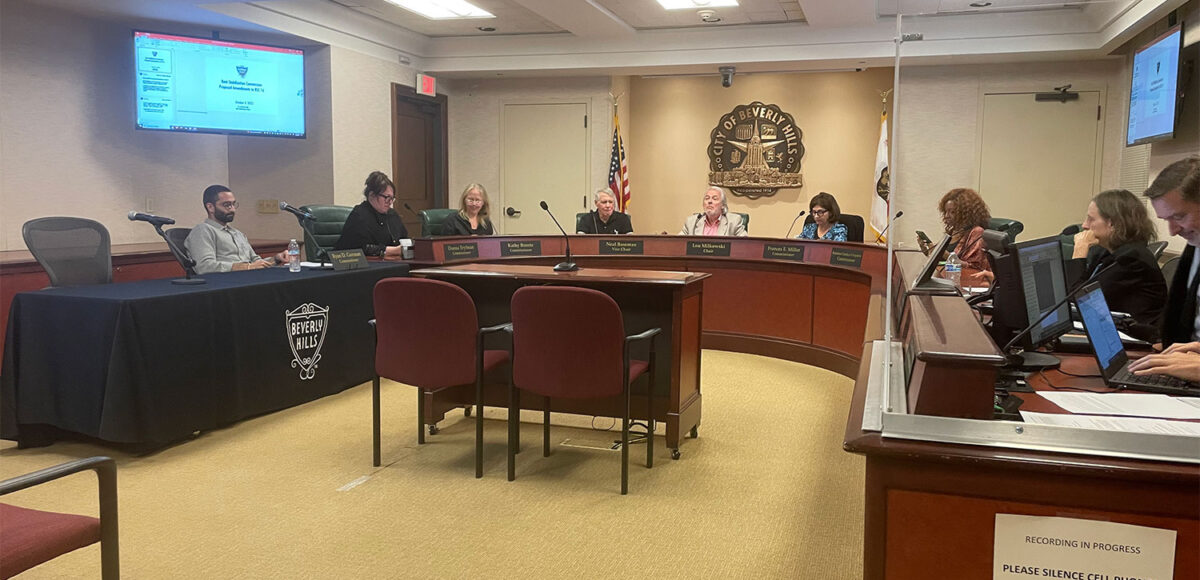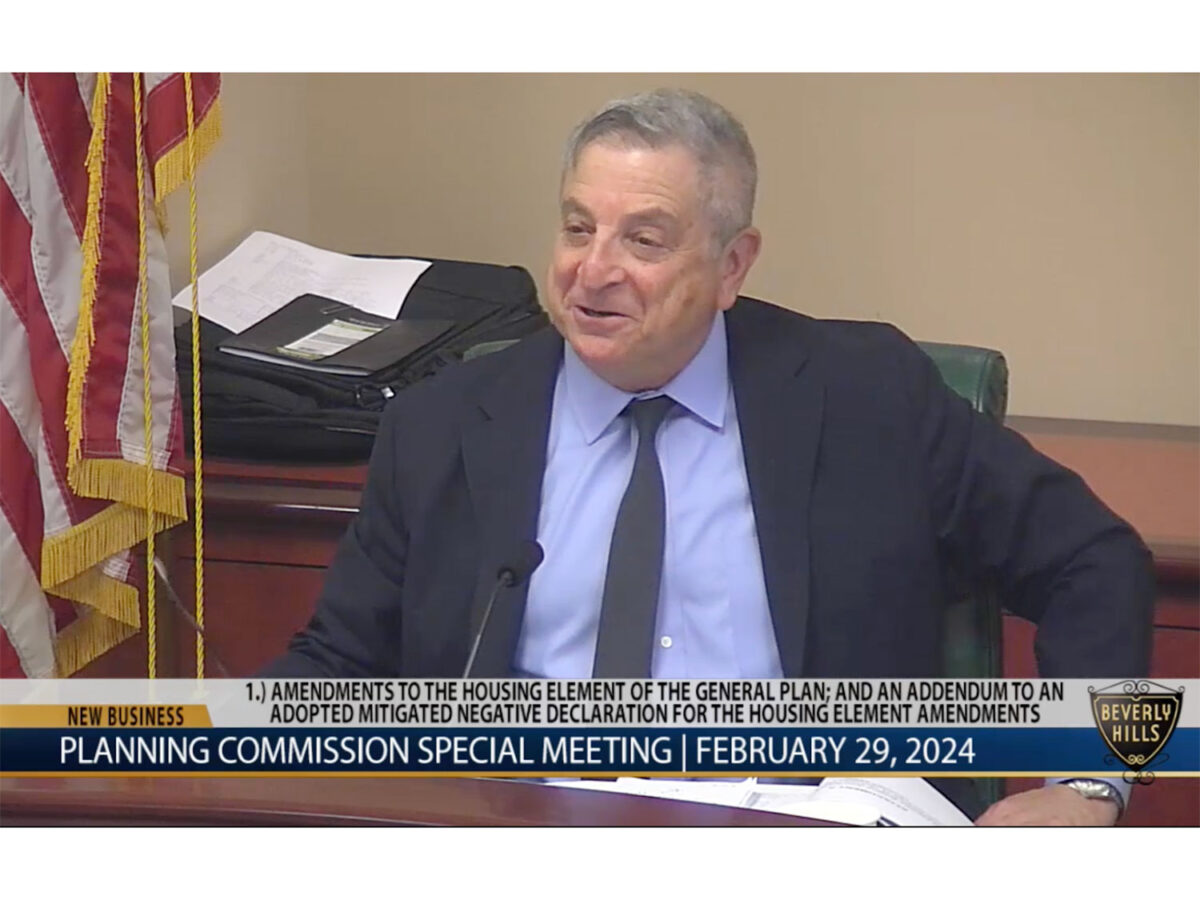Having completed a review of proposed amendments to 2022’s Rent Stabilization Ordinance (Resolution RSC-16), the Rent Stabilization Commission discussed some of these changes prior to any formal City Council recommendations.
This month’s meeting centered on four categories of potential RSC-16 updates, including policies related to habitability reporting and rent increases for units with active violations. Chair Lou Milkowski steered the Commission through two hours of questions, comments, and debates, its longest meeting since January.
Prior to considering the amendments, Senior Management Analyst Cameron Kesinger invited two public comments. The first, a written statement from Apartment Association of Greater Los Angeles Executive Director Dan Yukelson, was cut short due to the three-minute time limit. Yukelson’s abridged message expressed support for a complaint-based inspection program over a proactive system and decried the “harassment that property owners often undergo at the hands of the city of Los Angeles.”
The second speaker was Mark Elliot, a longtime tenant and founder of Renters Alliance. Elliot pointed to an old report that acknowledged problems with a previous self-attestation proposal, which he called a “means to avoid taking any substantive action.” He also characterized the lack of proactive enforcement as a long-standing issue.
“This is old wine in a new bottle,” Elliot said. “No wonder we have problems, problems that were highlighted in a memo from city officials 17 years ago. What was true 17 years ago continues to be true today.”
Discussion of the first altered recommendation, which concerned landlord attestation and tenant anonymous reporting, reflected a similar schism among the commissioners.
Originally, Resolution RSC-16 featured a baseline inspection of all 7,793 apartment units citywide in addition to the existing tenant-submitted grievance system. Deputy Director of Rent Stabilization Nestor Otazu’s first proposal was to implement a landlord attestation instead. The document would be screened by renters, who could flag any violations with photo or video proof within 30 days.
Rather than undergoing complete inspections, owners would be placed into categories affecting the frequency of checks and the percentage of a building’s units that would require examination. Repeated offenses would move properties across the tier system. Tenants would be able to flag issues anonymously if they felt uncomfortable identifying themselves through a formal complaint.
Commissioner Donna Tryfman favored the idea of a proactive reporting system. Tryfman was supportive enough to raise the possibility that the city had enough staff resources to go through with the initial plan, to which Otazu replied that the idea could bring challenges.
Vice Chair Neal Baseman, meanwhile, claimed that the attestation was impractical, and that anything besides a complaint-based system interfered with a goal of improving relationships.
“Maybe sometimes the city needs to be in the middle of it, but not from the beginning,” Baseman said. “We want to encourage landlords and tenants to get along, not have the city be this Big Brother.”
Another of the revisions to Resolution RSC-16 was aimed at a prohibition of annual rent increases with unaddressed violations. According to Otazu, this section needed to be revised or removed for several reasons. The language, most notably the mention of an “unaddressed” violation, was too vague — the resolution in its current form did not define a timeline to address issues, nor did it clarify whether a complaint was “addressed” if it was acknowledged or resolved. Other parts, such as the definition of “habitability” and the suggested 30-day period, offered multiple interpretations as well.
Otazu also found that a forced rent freeze would be an ineffective deterrent, due to the combination of the existing citation system and the possibility of landlords’ noncompliance. In that case, the two cases might be evaluated separately and arrive at conflicting verdicts.
The commissioners also clashed on the importance of anonymity in reporting throughout both sections. Commissioner Kandace Lindsey-Cerqueira asserted that tenants might be less likely to report violations if a landlord is aggressive. Commissioner Frances E. Miller, a landlord herself, questioned whether a landlord even had such an option if they could not raise rent prices or evict without cause, suggesting that tenants were the ones in a position to retaliate more.
“I don’t understand the value of [anonymity],” Miller said. “Even whistleblowers in Washington eventually have to testify, and they are identified.’
In response, Otazu noted that filing a complaint itself can make a tenant uncomfortable or create friction. Other commissioners noted that even under its previous form, a vindictive landlord could create a hostile reporting environment or increase rent after the complaint was addressed.
“I’m talking about any awkward, uncomfortable situations that may lead to retaliation,” Otazu said.
Two other amendments were discussed throughout the meeting. Specifics related to the Habitability Checklist, guidelines that the landlord would have to confirm to be following (and that tenants would use to flag habitability-related conditions), prompted a set of comments.
The Commission also considered its own role as an appeals body. Otazu expressed a desire to scrap Resolution RSC-16’s planned establishment of the Commission as an “Administrative Hearing Board,” since there was no city process for reductions in services determinations.
“We’re recommending that it be separated from this program,” Otazu said. “We think that this is an item that we can bring back to the Commission for future development.”
After one final round of feedback, the session wrapped up with a review of August’s monthly report and setting meeting dates through 2024. Even as the conversation turned more routine and procedural, however, there was a sense that these issues would remain on the front of the commissioners’ minds in future meetings.
“I know we’ve all been anxious to express our opinions,” Milkowski said. “It’s part of the process.”







